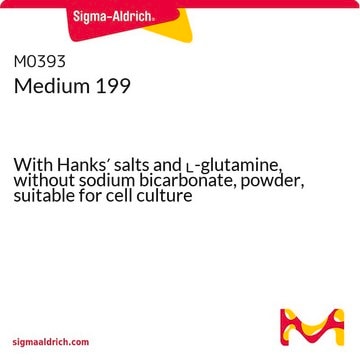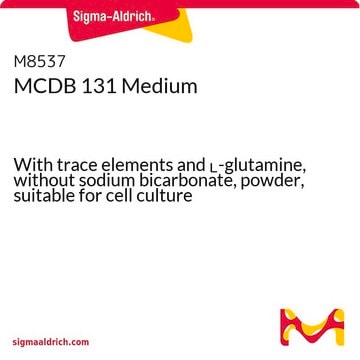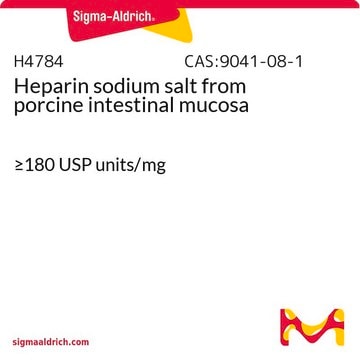M2154
Medium 199
With Earle′s salts and sodium bicarbonate, without ʟ-glutamine, liquid, sterile-filtered, suitable for cell culture
Synonym(s):
M199 Medium, TCM 199
About This Item
Recommended Products
product name
Medium 199, With Earle′s salts and sodium bicarbonate, without L-glutamine, liquid, sterile-filtered, suitable for cell culture
Quality Level
sterility
sterile-filtered
form
liquid
technique(s)
cell culture | mammalian: suitable
impurities
endotoxin, tested
pH
7.0-7.6 (25 °C, 209 g/L)
components
sodium pyruvate: no
L-glutamine: no
NaHCO3: yes
HEPES: no
phenol red: yes
Earle’s salts (5% CO2): yes
shipped in
ambient
storage temp.
2-8°C
Looking for similar products? Visit Product Comparison Guide
General description
Application
- to culture rumen epithelial cells from yearling Speckle Park beef heifers
- as a component of the maturation medium for the incubation of Cumulus oocyte complexes (COCs) from bovine ovaries
- as a component of the Dulbecco′s modified Eagle medium (DMEM) mixture to maintain rat neonatal cardiac myocytes (NCM)
Reconstitution
also commonly purchased with this product
Storage Class Code
12 - Non Combustible Liquids
WGK
WGK 1
Flash Point(F)
Not applicable
Flash Point(C)
Not applicable
Certificates of Analysis (COA)
Search for Certificates of Analysis (COA) by entering the products Lot/Batch Number. Lot and Batch Numbers can be found on a product’s label following the words ‘Lot’ or ‘Batch’.
Already Own This Product?
Find documentation for the products that you have recently purchased in the Document Library.
Customers Also Viewed
Articles
Medium 199 supports non-transformed cell cultivation in virology and vaccine production, offering broad species applicability.
Medium 199 supports non-transformed cell cultivation in virology and vaccine production, offering broad species applicability.
Medium 199 supports non-transformed cell cultivation in virology and vaccine production, offering broad species applicability.
Medium 199 supports non-transformed cell cultivation in virology and vaccine production, offering broad species applicability.
Our team of scientists has experience in all areas of research including Life Science, Material Science, Chemical Synthesis, Chromatography, Analytical and many others.
Contact Technical Service








